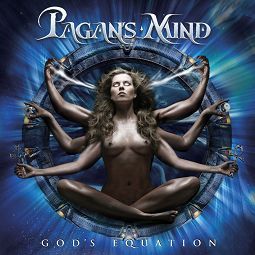

God's Equation by Pagan's Mind
|
Release date : November 2007
Reviewed by Mark Fisher

Background information
Review

Background information
Metal enthusiasts commonly associate Norway with the Black Metal genre, but that Scandinavian country has much more under its sleeve other than the Devil's mischief. Indeed, Pagan's Mind happens to be one such group. Several critically acclaimed full lengths figure amongst the group's discography (namely 2000's Infinity Divine, 2002's Celestial Entrance, and 2005's Enigmatic : Calling), and each has discovered a home in the hearts of both Progressive Rock and Metal admirers.
From March to June 2007, Pagan's Mind's fourth studio full length was recorded with the aid of engineer Espen Mjøen at the man's Mediamaker Studios, located in Skien, Norway. In co-operation with the group, guitarist Jørn Viggo Lofstad spearheaded production. Mixing duties fell to Stefan Glaumann, who was approached in light of his work alongside German Industrial Metal act Rammstein. Glaumann undertook the task at Toytown Studios in Stockholm, Sweden during July. One month later, Morten Lund mastered the album at Masterhuset in Oslo, Norway. Partly a concept album, God's Equation deals with the origins of all. The term itself was originally used to describe a scientific explanation of the universe, published by none other than eminent theoretical physicist Albert Einstein. The album's artwork sports the recurring appearance of the Stargate, whilst the “Mother Goddess” clasps several apparent religious symbols via her Shiva-inspired arm pairs.
During early September, release dates and artwork in support of God's Equation were revealed. By late September, its tracklisting had been unveiled. An e-card was additionally made available, surfacing in mid October. In late October, a music video in the support of the track “Atomic Firelight” was posted upon the group's official MySpace page. As part of the Daily Album Premiere show, Norway's Metal Express Radio streamed the entire album on November 1st. Nils K. Rue, the group's vocalist, introduced each composition.
Review
Delightful and eclectic, God's Equation's fusion of both technicality and Pop hooks displays an advanced thought process. Immediately, the album distinguishes itself from its peers. Whereas countless Power and Progressive Metal groups solely rely upon the soaring quality of catchy melodies, Pagan's Mind opt towards a slightly dirtier approach. A blazing Rock 'N' Roll demeanour characterises the guitars, and within the genre's confines, Nils K. Rue's vocals prove extremely diverse. Pagan's Mind repeatedly strives it seems, and circumvents much of the mistakes committed by excessively technical groups whom happen to be similar in style. Pagan's Mind solely concerns itself with the track in question.
Each track maintains a steady composure, an attractive quality within Pagan's Mind. Firmly stationed in left field territory, God's Equation fails to elicit any notion of disaffection. Extremely cohesive, the compositions consequently bleed into one another, a negative feature of such happenings. Albeit unique tracks, their general ambience mostly mirrors their fellow beings, and so the listener feels no need to distinguish each respective song. A stellar example of technical Rock 'N' Roll, the title cut shares those qualities with “United Alliance”, “Osiris’ Triumphant Return”, and “Painted Skies”. The trio adhere to the same format; as the tracks take flight, the drumming motions the feet to begin tapping. A signature anthemic chorus intensely hits before realisation dawns, and you greatly attempt to chime along. A prime rendition of David Bowie's “Hallo Spaceboy” (originally featured upon Bowie's 1995 album Outside) follows much the same format, though is admittedly more distinguishable in light of its familiarised status.
In certain instances, Pagan's Mind opt towards a slightly heavier stance. Consequently, this should delight music fans whose general listening preferences lean towards heavier material. Arguably God's Equation's heaviest cut, the screaming “Atomic Firelight” possesses crunching guitar riffs, and those guitar riffs demonstrate that Pagan's Mind is a group who can launch a kick towards your skull should they so desire. Whilst solely present during remote instances, heavier tracks remain present nonetheless.
Traditionally, this specific reviewer hasn't been a noted admirer of Pagan's Mind. Whilst God's Equation doesn't change this personal stance, it certainly inspires thoughts as to whether something is being particularly missed. An extremely commercial full length, God's Equation could open numerous doors for Pagan's Mind. A breakthrough album, Pagan's Mind now commands the attention of both the Rock and Metal landscapes. However, can Pagan's Mind maintain that focus?















